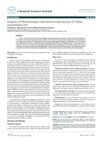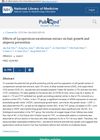 49 citations,
October 2017 in “Nutrients”
49 citations,
October 2017 in “Nutrients” Equisetum debile extract, especially the ethyl acetate type, may be a promising natural ingredient for anti-hair loss products.
 61 citations,
September 2010 in “Fitoterapia”
61 citations,
September 2010 in “Fitoterapia” Extracts from Tridax procumbens L. have strong anti-inflammatory and antioxidant effects and block inflammation-causing enzymes.
[object Object] 1 citations,
January 2019 in “Journal of pharmacy & pharmacognosy research” The flavonoid-rich extract of Equisetum hyemale can help regrow hair in cases of alopecia.
 1 citations,
October 2001 in “Journal of Wood Science”
1 citations,
October 2001 in “Journal of Wood Science” Some extracts from woods and fungi can promote hair growth better than a known hair growth substance.
 March 2024 in “Journal of Pharmaceutical and Sciences”
March 2024 in “Journal of Pharmaceutical and Sciences” Zaleya pentandra extracts, especially acetone, may be useful for new medicines and food industry applications.
November 2023 in “Plants” Compounds from Jatropha cordata bark have significant anti-inflammatory effects and could help with hair loss.
 January 2023 in “Acta medica Philippina”
January 2023 in “Acta medica Philippina” Papaya flower extract may help with hair growth by blocking a hair loss enzyme and acting as an antioxidant.
January 2023 in “Applied sciences” Equisetum debile extracts may help with skin whitening, anti-wrinkle, and anti-hair loss treatments.
 July 2021 in “Research Square (Research Square)”
July 2021 in “Research Square (Research Square)” Semecarpus anacardium leaf extract fights breast cancer and extends survival in mice.
 January 2020 in “bioRxiv (Cold Spring Harbor Laboratory)”
January 2020 in “bioRxiv (Cold Spring Harbor Laboratory)” Semecarpus anacardium leaf extracts may offer safe, effective cancer treatment alternatives.
 6 citations,
October 2016 in “Food Science and Biotechnology”
6 citations,
October 2016 in “Food Science and Biotechnology” The water extract of Bituminaria bituminosa, high in phenolic compounds, shows strong antioxidant and enzyme inhibitory potential.
 5 citations,
November 2017 in “Asian journal of pharmaceutical and clinical research”
5 citations,
November 2017 in “Asian journal of pharmaceutical and clinical research” Pakis Gajah (Angiopteris evecta) water extract may promote hair growth in rabbits, but more research is needed for human use.
 1 citations,
February 2021 in “Cosmetics”
1 citations,
February 2021 in “Cosmetics” Fagraea berteroana fruit extract may promote hair growth by affecting cell proliferation and hair growth pathways.
 June 2014 in “Journal of biomedical research”
June 2014 in “Journal of biomedical research” Sargassum fusiforme extracts help promote hair growth.
 2 citations,
May 2021 in “Molecules”
2 citations,
May 2021 in “Molecules” A new method was created to analyze certain chemicals in the urine of alopecia areata patients, revealing they have higher metanephrine content. This method can also be used for other related diseases.
 23 citations,
March 2019 in “Journal of Essential Oil Research”
23 citations,
March 2019 in “Journal of Essential Oil Research” Rosemary's antioxidant content changes with the climate and season.
[object Object] 2 citations,
February 2021 in “IOP Conference Series Earth and Environmental Science” Mangkokan leaf contains various beneficial compounds like alkaloids, flavonoids, and steroids.
 1 citations,
August 2017 in “Asian Journal of Pharmaceutical and Clinical Research”
1 citations,
August 2017 in “Asian Journal of Pharmaceutical and Clinical Research” The 1% ethyl acetate fraction ethosomal gel from Nothopanax scutellarium leaves promotes hair growth but can mildly irritate the skin.
 13 citations,
January 2015 in “Evidence-based Complementary and Alternative Medicine”
13 citations,
January 2015 in “Evidence-based Complementary and Alternative Medicine” Garlic chive extract helped mice grow more hair by increasing a specific growth factor.
 December 2022 in “Journal of applied biological chemistry”
December 2022 in “Journal of applied biological chemistry” Betula platyphylla extract, particularly the H3-2 fraction, may help treat hair loss by promoting cell growth and inhibiting a hair loss-related enzyme.
 23 citations,
January 2001 in “International journal of toxicology”
23 citations,
January 2001 in “International journal of toxicology” St. John's Wort extract and oil safety in cosmetics is unclear; more data needed on photosensitization, toxicity, and human irritation.

Neem leaf extract combined with eucalyptus and lemongrass oils can effectively treat Tinea capitis.
 31 citations,
October 2020 in “Journal of nanomaterials”
31 citations,
October 2020 in “Journal of nanomaterials” Silver nanoparticles made from Grewia optiva leaf extract show strong antibacterial, antioxidant, and hair growth benefits.
 25 citations,
August 2015 in “International Journal of Cosmetic Science”
25 citations,
August 2015 in “International Journal of Cosmetic Science” Malva verticillata seed extract might help treat hair loss by activating hair growth signals in skin cells.
 19 citations,
August 2014 in “Journal of Ethnopharmacology”
19 citations,
August 2014 in “Journal of Ethnopharmacology” The study created a test that found hormonal and toxic effects in plant and fungal extracts using prostate cancer cells.
 3 citations,
January 2016 in “Chemical sciences journal”
3 citations,
January 2016 in “Chemical sciences journal” Tridax procumbens plant extracts, especially from ethanol, have strong antibacterial effects and contain beneficial compounds like flavonoids and tannins.
 5 citations,
September 2020 in “Molecules”
5 citations,
September 2020 in “Molecules” Extracts from three Polynesian plants were found to promote hair growth by affecting cell growth and gene expression related to hair.

Tomato extract can promote hair growth and prevent hair loss without irritating the skin.
1 citations,
February 2022 in “Research journal of pharmacy and technology” Wrightia tinctoria extract may promote hair growth better than minoxidil.
September 2024 in “Journal of Ethnopharmacology” Terminalia bellirica extracts effectively promote hair regrowth and treat androgenetic alopecia.























